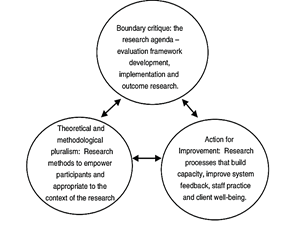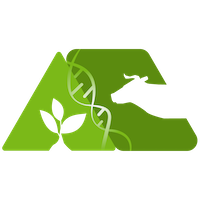Implemetation of a referential framework to evaluate the sustainable development of family farmers in the Southeast of Uruguay
DOI:
https://doi.org/10.31285/AGRO.25.414Keywords:
co-innovation, family farmers, rural extension, systems thinking, sustainabilityAbstract
This research aimed to explore means of evaluating a co-innovation and interinstitutional project for the sustainable development of family farmers in the Southeast of Uruguay (named FPTA 343) in order to finally implement an Evaluation Monitoring Framework (EMF) for assessing the accomplishment of the main actors’ aims.
Data arose primarily from diagnoses of the social, technical and economic situation in the region, and interaction activities with farmers in the local groups, institutions and technicians (through interviews and workshops). Results demonstrated it is possible to adapt and implement an EMF, including the following steps:
- Describing the region or formulating the problem, including values of the actors involved.
- Discussing boundaries using multiple methodologies and theories (especially some that allow to explore sources of motivation, power, knowledge and legitimacy), and planning for rural sustainable development, considering the principles of “endogeneity”.
Actors were able to actively participate by getting involved in the follow-up and evaluation of the project. The generation of shared spaces of dialogue is considered a starting point for the promotion of actions, contributing to farmers feeling subjects of the development to be encouraged, preventing identified issues of marginalisation and increasing their chances of sustainability. The most important contribution of this research is the creation of new ties, patterns and expectations, as well as the communication of new ways of appreciating extension, that could lead the generation of new purposes and goals.
Downloads
References
Alvarez J, Areosa P, Molina C, Rodriguez N, Hegedus P. Caracterización del sistema de innovación para la ganadería familiar en la región de la Sierras del Este de Uruguay. Revista de Investigación de Agroproducción Sustentable. 2018;2(2):80-90.
Beer A, Maude A, Pritchard W. Developing Australia's Regions: Theory & Practice. Sydney: UNSW Press; 2003. 336p.
Berretta EJ. Uruguay: perfiles del recurso pasturaforraje. In: Sitio Argentino de Producción Animal [Internet]. 2003 [cited 2020 Dec 23]. 29p. Available from: https://bit.ly/38qzp8y.
Catullo J, Torres, G, Mazzola C. El rol de los equipos interdisciplinarios de extensión frente a los nuevos desafíos de la ruralidad en Latinoamérica. ReD+ER. 2014;1(2):36-40.
Checkland P. Soft systems methodology: a thirty year retrospective. Syst Res Behav Sci. 2000;17(S1):S11-S58.
Christoplos I, Sandison P, Chipeta S. Guide to evaluating rural extension. Switzerland (CH): GFfRA; 2012. 52p.
Courdin V, Sabourin E. Continuidad y renovación en la acción colectiva de los ganaderos familiares del litoral noroeste de Uruguay. Eutopía. 2018;13:11-32.
Fairclough N. Analysing Discourse: Textual Analysis for Social Research. London: Routledge; 2003. 288p.
Klerkx L, Gildemacher P. The role of innovation brokers in agricultural innovation systems. In: Brizzi A, Janssen W, Watkins A, Lantin M, Wadsworth J, editors. Agricultural innovation systems: an investment sourcebook. Washington (DC): World Bank; 2012. p. 221-30.
Landini F, Olivera Mendez A, De Hegedüs P. Psychology's Contributions to Extension: State of the Art and Calls to Action. J Ext. 2017;55(4):101-5.
Maturana H. Reality: the search for objectivity or the quest for a compelling argument. Irish J Psychol. 1988;9:25-82.
Midgley G. Systemic Intervention [Internet]. Yorkshire (GB): University of Hull; 2014 [cited 2020 Dec 23]. 17p. (Research Memorandu; 95). Available from: http://bit.ly/3aBdjD5.
Midgley G. Systems Thinking for the 21st Century. In: Midgley G, editor. Systemic Intervention: Philosophy, Methodology, and Practice. Boston (MA): Springer; 2000. p. 249-56.
Midgley G. The Systems Idea. In: Midgley G, editor.. Systemic Intervention: Philosophy, Methodology, and Practice. Boston (MA): Springer; 2000. p. 33-67.
Midgley G, Ahuriri-Driscoll A, Foote J, Hepi M, Taimona H, Rogers-Koroheke M, Baker V, Gregor J, Gregory W, Lange M, Veth J, Winstanley A, Wood D. Practitioner identity in systemic intervention: reflections on the promotion of environmental health through Māori community development. Syst Res Behav Sci. 2007;24(2):233-47.
Midgley G. Boundary Critique. In: Midgley G, editor. Systemic Intervention: Philosophy, Methodology, and Practice. Boston (MA): Springer; 2000. p. 135-58.
Ministerio de Ganadería impulsará a productores ganaderos en zonas con escasez de agua. Uruguay Presidencia [Internet]. 2013 Jul 17 [cited 2020 Dec 23]. Available from: http://bit.ly/3haSKi6.
Ministerio de Ganadería, Agricultura y Pesca, DIEA (UY). Anuario Estadístico Agropecuario 2015. Montevideo: MGAP; 2015. 215p.
Ministerio de Ganadería, Agricultura y Pesca, OPYPA (UY). Resultados de la Encuesta Ganadera Nacional. Montevideo: MGAP; 2016. 62p.
National Research Council. Toward Sustainable Agricultural Systems in the 21st Century. Washington (DC): The National Academies Press; 2010. 598p.
Plummer P, Tonts M, Martinus K. Endogenous Growth, Local Competitiveness and Regional Development: Western Australia’s Regional Cities, 2001-2011. JESP. 2014;16(1):1-29.
PROCISUR. El rol de la extensión rural en la gestión de innovaciones. Montevideo: PROCISUR; 2012. 19p.
Röling N. The agricultural research-technology transfer interface: a knowledge systems perspective. In: Kaimowitz D, editor. Making the link: agricultural research and technology transfer in developing countries. New York: CRC Press; 1990. p. 1-43.
Rossing WAH, Dogliotti S, Bacigalupe GF, Cittadini E, Mundet C, Mariscal Aguayo V, Douthwaite B, Alvarez S. Project design and management based on a co-innovation framework. In: Building sustainable rural futures: the added value of systems approaches in times of change and uncertainty. Viena: IFSA; 2010. p. 402-12.
Rural development: some issues in the context of the WTO negotiations on agriculture. In: FAO Papers on Selected Issues Relating to the WTO Negotiations on Agriculture [Internet]. Rome: FAO; 2002 [cited 2020 Dec 23]. Available from: http://bit.ly/34GHYuK.
Sabourin E, De Torres Alvarez MF, Arbeletche P, Massardier G, Courdin V, Tourrand JF, Morales H. Políticas públicas y ganadería familiar en Uruguay: los desafíos ambientales y de ordenamiento territorial. Pampa. 2015;11:241-64.
Sposito V, Faggian R. Systemic Regional Development: A Systems Thinking Approach. Informationen zur Raumentwicklung [Internet]; 2013 [cited 2020 Dec 23];(Heft 1):12p. Available from: https://bit.ly/2LJ6pkw.
Stephens A. Systemic Intervention Practice at an Australian Aboriginal and Torres Strait Islander Alcohol and Other Drugs Treatment Centre. Syst Pract Action Res. 2014;27:309-23.
Ulrich W. Critical Heuristics of Social Planning: A New Approach to Practical Philosophy. Bern: P. Haupt; 1983. 504p.

Published
How to Cite
Issue
Section
| Article metrics | |
|---|---|
| Abstract views | |
| Galley vies | |
| PDF Views | |
| HTML views | |
| Other views | |

















